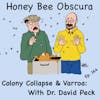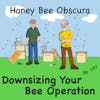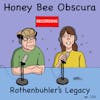Moving Honey Supers in the Fall (144)

This week, we continue with the theme of Fall management. Kim is out so, Jim invites Jeff Ott, from Beekeeping Today Podcast to join him to talk about dealing with heavy honey supers that remain and prepping the colonies for the coming Winter. Jim...
 This week, we continue with the theme of Fall management. Kim is out so, Jim invites Jeff Ott, from Beekeeping Today Podcast to join him to talk about dealing with heavy honey supers that remain and prepping the colonies for the coming Winter.
This week, we continue with the theme of Fall management. Kim is out so, Jim invites Jeff Ott, from Beekeeping Today Podcast to join him to talk about dealing with heavy honey supers that remain and prepping the colonies for the coming Winter.
Jim uses all 10-frame deep equipment, including his honey supers. It is just the way he’s always done it. But now, moving all that weight is a challenge to get to the brood boxes below to check on the queen and do proper mite level checks. What are your options when you have to move pounds of honey - any time of year, just to do an inspection?
In the past, Jim has also had to deal with Fall swarms. Why do they swarm in the Fall? What can you do when this happens? Will these swarms have any chance of surviving the winter?
Listen today as Jim and his guest talk about the challenges of Fall management.
______________________
Thanks to Betterbee for sponsoring today's episode. Betterbee’s mission is to support every beekeeper with excellent customer  service, continued education and quality equipment. From their colorful and informative catalog to their support of beekeeper educational activities, including this podcast series, Betterbee truly is Beekeepers Serving Beekeepers. See for yourself at www.betterbee.com
service, continued education and quality equipment. From their colorful and informative catalog to their support of beekeeper educational activities, including this podcast series, Betterbee truly is Beekeepers Serving Beekeepers. See for yourself at www.betterbee.com
______________________
Honey Bee Obscura is brought to you by Growing Planet Media, LLC, the home of Beekeeping Today Podcast.
Music: Heart & Soul by Gyom, All We Know by Midway Music, original guitar music by Jeffrey Ott
Copyright © 2023 by Growing Planet Media, LLC

Episode 144 – Moving Honey Supers in the Fall
Jim Tew: Listeners, last week, you may recall that we talked about fall management, and getting ready for fall, and prepping and whatever. I thought I'd punched myself out on that, but I really haven't. I've got some other issues and some other concerns I want to talk about. Jeff's here. Hi, Jeff.
Jeff Ott: Hey, Jim. Thanks for inviting me on.
Jim: I always appreciate you being back to talk with me and help me put my thoughts together. You in the mood for finishing up some more discussion on fall management, and why it's so important to us as beekeepers?
Jeff: I am. I have work to do this coming weekend to do the final fall prep. This is really timely. Thanks.
Jim: You're reading my mind because it's a lot of work, and I want to complain about some things if I could. Let's do that. Hi, I'm Jim Tew.
Jeff: I'm Jeff Ott from Beekeeping Today podcast.
Jim: We're coming to you today at Honey Bee Obscura, where we want to go over again, as though we didn't cover it the last time, the concepts of fall management, what's really expected, what the bees require of us, and some idea of how to do it.
Introduction: You are listening to Honey Bee Obscura, brought to you by Growing Planet Media, the folks behind Beekeeping Today podcast. Each week on Honey Bee Obscura, hosts Kim Flottum and Jim Tew explore the complexities, the beauty, the fun, and the challenges of managing honeybees in today's world. Get ready for an engaging discussion to delight and inform all beekeepers. If you're a long-timer or just starting out, sit back and enjoy the next several minutes as Kim and Jim explore all things honey bees.
Jim: Jeff, this is where I'm trying to get to. I don't want it to turn into a pity-me-old-man party, but I've got a lot of honey back there still. As a young man, young beekeeper, eager beekeeper, you could not make enough honey. I've got honey everywhere. I sell it, I give it away, I leave it on the hives, I leave it in the colonies, sometimes the bees rob it out. It just doesn't have the requirement that I've got. One of the issues that I'm dealing with is I've got some full deeps of honey back there, and I'm not a young man. Most beekeepers who've kept bees for a long time, really don't have any friends because they've long since worn their friends out, their relatives, their cousins, their brothers. They've used up everybody, and I'm pretty much in that state.
Jeff: Is that because they give away all their honey?
Jim: It's because you abuse people. Taking away honey, taking honey off, robbing, bundled up, smokers going, crazy bees, crazy beekeepers. After a while, you can't even find someone to pay. Anyway, now I'm really whining. I'm really whining too much. The biggest issue I've got right now on my fall preparation is I've got a nice honey crop in the way of me performing routine fall management. When you take the honey off, you've got to do something with it. Right away then I've got this conflict. I'm extracting honey, and I'm trying to get set up, and I should be out there dealing with fall season, mite control, preparation for brood nest positioning, all the things I should be doing.
Jeff: Let's get a visual picture of your hives. You're running two deeps, and you have mediums on top?
Jim: No, Kim has reprimanded me over and over and over again through a fluke. I no longer have my dad, but my dad was a beekeeper also. He had equipment supply, a little place set up out in his shop, and he sold equipment to neighboring beekeepers. When dad had to leave this dimension, I inherited all of that. I inherited about 400 knockdown deeps, brand new, new-old stocks. I have historically only used deeps, and it is 10 frames deep. It just gets as bad as it can. All of my bees back there, every one of them, are in deeps. On one hand, it really works out well. Everything's interchangeable, everything's the same size, but everything is heavy. Oh, my stars, everything is heavy when those bees fill those deeps. Some of my colonies right now, if you want a picture of ugliness in its true form, while beauty still pervades the place, they're in five deeps.
Probably the bottom two deeps are brood, and probably half the third deep is some brood, and then probably two deeps on top, a chunk of block full of honey.
Jeff: Just to get down into the brood, you're having to move 90-pound boxes of honey. What's your complaint?
[laughter]
Jim: My complaint is that I'm an old man with limited resources. I'm embarrassed to tell the listeners and you how often I've told people who would say, "What can I do, Jim? I've got this heavy box." I would say with an air of authority of one who has never done it, "Just take out one frame at the time. Don't try to take the whole box. Just take one frame at the time." If you want to see bedlam in the apiary, you go to my beautiful colonies, there's none more than five tall.
Jeff: That's five deeps.
Jim: Five deeps tall, and 70,000 bees or so. They are beautiful colonies. You try to take out one frame at the time. It's a suicide mission for you and the bees both, gouging out a frame, standing on a ladder, singing this song of your choice in your mind. Just everything's great, right? No, it's a terrible job, Jeff. It's terrible.
Jeff: The bees, this time of year, probably near max population, and you're sitting there, there's a dearth on, so there's a lot of bored bees sitting around back at home, or there's a lot of bees in that colony, and folks are brushing off bees, taking out a frame, and trying to brush bees off back into the box. That's a very difficult task.
Jim: I was drawing in my mind while you were saying that. The only way you could take out a frame or two at the time and brush the bees off is if that colony is almost certainly going to die in the next few months during the winter because it's just not going to be powerful enough to do so. I don't know what to tell you or the listeners. I know what I've got to do. I've got to get it off. I've tried to figure out some way to use the loader on my little tractor to help me along. If I just had not reached this senior citizen age, you just go out there and manly grab the box, twist it, bees everywhere, grunt and groan, and pick it up, and move it around, and set it up, and blow the bees out. I've done that hundreds and hundreds of times, and finally get all the bees out, but I simply am not going to be able to do that anymore.
I don't have a good plan B, and that's why I wanted to talk with you again in this continuation about fall management, because I can't really get to my population of bees to manage them because I've got this honey barrier above.
Jeff: One of the recommendations I like to make, and I use at times with myself, even though they don't work as effectively, is to use a fume board to get the bees out of that top deep. It's going to take longer to do, so usually, if I have supers I have to remove this time of year, I'll run with three different fume boards and get them going, and then walk away, go have a coffee or something, and just get them going. Even if it's not sunny, even if it's not warm in the Pacific Northwest, if you leave them on long enough, you'll get a majority of bees out of that super. Then brushing them off. Then the second part of this is, is have an empty super behind me or somewhere away from the parent colony, and so then when I brush the bees off, I take that frame back to the empty, put a top on it, and go back to the super I'm emptying.
That way, I can keep the riffraff from increasing in the bee yard because I cover it in the empty deep behind me, or the empty super. Then I'm just going back and forth, and the bees I brush off, they'll stay with the colony, and generally don't follow me too much to wherever I'm storing the super. Of course, you're going to find the bees that are always on the lookout. They will find your empty deep, and so will the Yellow Jackets, but that's better than dealing with 70,000 bees you're trying to brush off and get to the next frame. That's my approach. Now, I still haven't taken that box off for you, but--
Jim: Wow, you've got an approach going. Can you give me just a minute to let me think about this and get my arms around it? While I'm thinking, we'll hear from our sponsor.
Betterbee: Are you ready to savor the sweet rewards of beekeeping? Look no further. Betterbee is proud to offer honey extraction and processing equipment brought to you by the renowned Lyson. Lyson is a global leader known for their impeccable craftsmanship and cutting-edge designs. Unlike other options, Lyson extractors boast unrivaled durability, and are certified food grade, making them safe for health and the environment. Plus, the rust-resistant stainless steel is a breeze to clean, promising an extended service life. From 4-frame to 56-frame extractors, we've got you covered. Visit betterbee.com/extract to explore our wide range of options.
Jim: That certainly is a possibility. I've still got some devil in the details because see, my colonies are on nice hive stands. I've got them about 20 inches off the ground. Then I've got a colony that's four to five deeps tall. Back in the spring when I was putting them on, I'm thinking, "I'm going to take these off before this colony gets so tall," because if anybody's wondering, "Why'd you let them get so tall?" Because life gets in the way. I'm a one-man band. Grass is growing, shed needs painting, friends need help with whatever they're working on, and so you think, "Well they're going to swarm if I don't do something." You just keep adding boxes and next thing you know, they're five tall as I made promises, but I'm up on a ladder most of the time. That means I got to take that frames, take two, three steps down, move over to maybe a table, and then-- When you were saying all this, I was thinking there is no divine way, there is no beautiful simple system that I've overlooked.
This is just going to be like unstopping a plugged toilet. In a way, it's just a job you got to get through and try not to kill any more bees than I can, than I have to, and respect the fact that the bees made it. I've got beautiful colonies.
Jeff: Jim, [laughs] I would think that this next winter you ought to build up some medium supers. I think that would work out well for your season next year.
Jim: Well, there you go on medium supers and Kim wants me to go up to eight frame. Everybody [laughs] has a system. Here I am with this-- I've got it down now to probably 100 or so boxes left of Dad's stuff.
Jeff: Do you remember what makes they're?
Jim: Dadant manufactured them.
Jeff: Oh, they're Dadant boxes? Cool.
Jim: They were commercial-grade things that Dad would buy them by the small truckload. 20 years ago, 30 years ago when Dad had these and I was inheriting them and the inventory, I had the physical stamina for it. I've tried to think, "Well, why don't you petition them and then run half colonies, duplexes?" Well, I've still got the weight. I still have the total weight, even though I'm running double colonies, and running those double colonies in duplexes always gave me grief anyway because got to keep the queen separated. I don't know where I'm going with this, listeners and Jeff. I've got to get by a divine problem. I've got all this nice honey, but I'm suddenly really backed up in my bee operation because I need to process the honey so I can get to the bees to handle them better.
Am I complaining? Not really. I'm trying to adapt to a different type of beekeeping and I can manage better. I guess that's what I was trying to talk about to hear myself talk. I don't need these big colonies anymore.
Jeff: Well, last week we talked about, and we won't go into it now, but talking about Varroa and managing for Varroa. Let's say that you've come up with a way, at least for this season, to deal with those five heavy boxes on top and you're down into the brood nest, what do you look for in the fall to make sure your bees will get through the winter, besides the mite count?
Jim: Well, that's the main thing is the mite count and whatever. The other thing is you just do a quick check. I don't look at every frame. You can look at the-- or I think you can. You can look at the top bars and see bees boiling out all over. You don't have to look at every one of those frames. As a younger beekeeper interested, I want to see everything, I would pull out most of those frames. As a guy now who's on a timeframe and I have limited energy, I don't pull all those frames out anymore. We have a quick look, but what am I looking for? Is the queen there or was there any surprises that the brood population, the bee population's not what I thought? Is all the honey banded in the right place? It looks like a winnable colony.
I need to get it in two deeps because in a perfect world, Jeff, I would put some kind of insulation on, some kind of wrapping or papering or windbreak. I can't do that if these things are still in five or six deeps tall and nothing's standardized. There is an issue that I haven't had this year that I want to quickly go into. These beautiful colonies that are tall this late in the year, two years ago, and for the two years prior to that, I had late-season swarms. Really late-season swarms. I'd have to go back and look in the journals because, of course, I wrote about it. I would have three and four-pound swarms hanging out there in the first week in October. Well, I had plenty of honey. That didn't happen this year. I had plenty of honey. You just give them some honey and everything's all out of balance. The brood's not there. The nest area's not set up, but why would they do that?
I tried to come up with reasons, maybe some kind of suicide swarm, some kind of population adjustment mechanism.
Jeff: When you see late-season swarm, what time of year determines a late-season swarm? How late can a beekeeper expect to see a swarm? I guess it's country and region-specific, but where are you? Is it September, October?
Jim: I was in late September. I was approaching October. I was in full Goldenrod, fall Aster bloom. I wasn't greatly bothered by it. I didn't know why they were doing it. As long as you can get the swarm, it suddenly turns into spring in October because can you get to the swarm? Can you get to it? Oh my stars, do I have a box ready?
Jeff: [laughs]
Jim: I'm like the bees, this is out of sequence, this is out of sync. The one thing Jeff that always gave me grief was somewhere in my apiary, probably it's my apiary, I've got a colony now that's undergoing queen replacement in early October, maybe late September. There's drones still there, but boy, we're cutting this closely now. You got to have a queen mate, establish herself in the old part of the colony that stayed. Everything about this is just screwed up and I think it's probably my fault.
Jeff: What's the drone viability this time of year? How strong are the drones?
Jim: As far as I know, they go straight through to the frost.
Jeff: A late-season drone is strong as a spring drone?
Jim: I don't know. I would guess strictly that they are. Would there be any difference in an early-season drone and a late-season drone? I think you probably want the drones where they have perfect seasonal flying conditions and are taking their sorties everyday checking, but you've really lured me off the subject. I have no earthly idea, come to think of it, but there's late-- They got to find drones to mate anyway. Either way. Then how far off the subject do you want to get? Because I didn't see them last year, but I've seen drones in the middle of the winter. I've never seen that in my life. I went back there trying to show anybody and nobody was back there in my yard, "Look, look, there's live drones [laughs] in this colony in December in Ohio." I'm rambling all over.
A lot of this I think is my fault for employing the modern-day current beekeeper techniques where you build up booming populations in tall boxes that are reasonably well-managed since I get these spectacular populations from these pumped-up queens that just seem to go barrel headlong into fall out of adjustment if I could word it that way.
Jeff: A cascading effect of multiple events lead up to this very difficult fall when it should be a time when we're settling down and buttoning up and getting ready to get caught up in all the journals and all the bee literature that we've missed during the season.
Jim: We're out of time. I actually want to apologize to anybody who's listening. Is this a problem? Is Jim actually complaining because he has too much honey on colonies that are too strong? What would it take to make that man happy? As I hear my own comments, listeners, I'm happy to have the problem. I just don't really know how I'm going to deal with it. It's going to be tiresome. It's not going to be, "Oh, this is one of the happiest bee days of my life." [laughs] When I finally get that honey in buckets and get it in the jars and you stand there and you think, "All that I had to go through." I'll finish on this note. Anytime somebody hands me a pound of honey at a bee meeting somewhere usually, I have a deep appreciation for what it took to get that honey in that jar. I always appreciate it, I think more than just handing it to somebody at your church or at your school or whatever.
Well, I've got to deal with it. I know what I've got to do. You've been helpful and you gave me a moment just to add to the fact that sometimes fall management's hard to accomplish because the honey crop you should have had off is still in the way.
Jeff: I'll give you three words, Jim. Eight frame supers. Just we'll leave it there.
[laughter]
Jim: I'll put in dummy frames or whatever and use my 10 frames with eight frames. That's not going to work. Until you and I can talk again, until next week, I look forward to talking about bees again.
Jeff: Thank you, Jim.
Jim: I wish you all the best, friend.
[00:19:42] [END OF AUDIO]
New to Honey Bee Obscura Podcast?
Here are some great episodes to start with. Or, check out episodes by topic.














